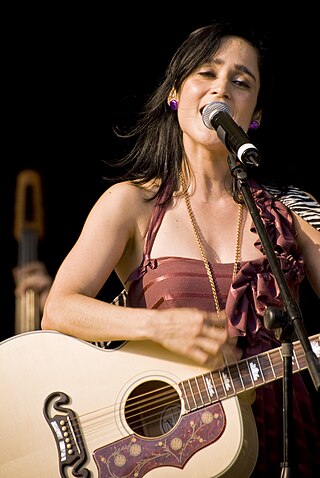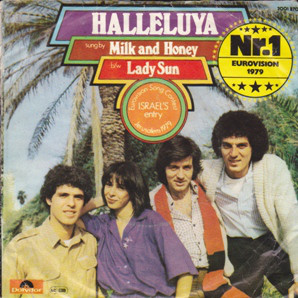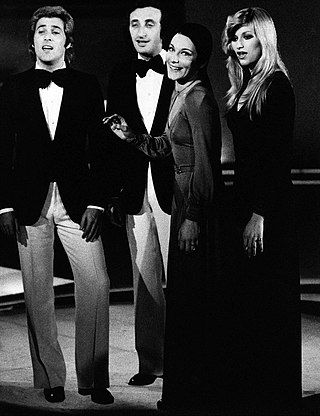Related Research Articles

Natacha Atlas is an Egyptian-Belgian singer known for her fusion of Arabic and Western music, particularly hip-hop. She once termed her music "cha'abi moderne". Her music has been influenced by many styles including Maghrebain, hip hop, drum and bass and reggae.

Sarit Hadad is an Israeli singer. She was named by Channel 24 as the "best female singer of the 2000s" in October 2009. She represented Israel with the song "Light a Candle" at the Eurovision Song Contest 2002 in Tallinn, Estonia.
Nydia Caro is an American singer.

Julieta Venegas Percevault (Spanish pronunciation:[xuˈljetaβeˈneɣas]; born on November 24, 1970, Julieta Venegas is an American-born Mexican singer, songwriter, instrumentalist, and producer who specializes in pop-rock-indie music in Spanish. She embarked on her musical journey by joining several bands, including the Mexican ska band Tijuana No!. Venegas is proficient in playing 17 instruments, including the acoustic guitar, accordion, and keyboard.

Jerry Rivera is a Puerto Rican salsa singer and songwriter.

"Hallelujah" is a song recorded by Israeli band Milk and Honey with music composed by Kobi Oshrat and Hebrew lyrics written by Shimrit Orr. It represented Israel in the Eurovision Song Contest 1979 held in Jerusalem, winning the contest.

Ricchi e Poveri is an Italian pop group formed in Genoa in 1967, originally consisting of Angela Brambati, Angelo Sotgiu, Franco Gatti and Marina Occhiena. Active since the late 1960s, they have sold over 20 million records.
Los Niños de Sara is a Spanish-speaking Gitano musical group from Montpellier, France. They perform on their own, but they are best known for the involvement in the musical group Alabina.

Esther "Eti" Zach, known by her stage name Ishtar (אישתאר), is a French-Israeli vocalist who performs in Arabic, Hebrew, Bulgarian, French, Spanish, Russian and English. She is best known for her work as the front vocalist of the French-based band Alabina, and her solo pop hits such as "C'est la vie", "Last Kiss", "Horchat HaEkaliptus" and "Habibi (Sawah)".

Pastora Pavón Cruz, known as La Niña de los Peines, is considered the most important woman flamenco singer of the 20th century. She was a sister of singers Arturo Pavón and Tomás Pavón, also an important flamenco singer, and aunt to Arturo Pavón, the first flamenco pianist. Both brothers, Pastora and Tomás, together with singer Manuel Torre, were the inspiring models for the next generation of singers like Antonio Mairena, Pepe de la Matrona or Fosforito, who led the movement towards the revival of traditional forms in the decades of the 1950s-1970s.

Daniela Romo is a Mexican singer, actress and TV hostess. During her career, she has sold 15 million records, making her one of the best-selling Latin music artists.

Colbie Marie Caillat is an American singer-songwriter. She rose to fame through social networking website Myspace. At that time, she was the number one unsigned artist of her genre.
"Que nadie sepa mi sufrir", also known as "Amor de mis amores" is a song originally composed by Ángel Cabral that has been recorded by numerous Spanish language artists such as Alberto Castillo, Julio Jaramillo and María Dolores Pradera. However, it is also known as "La Foule", a French language version with new lyrics written by Michel Rivgauche, popularized by famed French vocalist Édith Piaf and released in 1957.

"Helwa ya baladi" is an Egyptian Arabic song by Dalida from 1979, enjoying great popularity in the Middle East and the Arab diaspora. The song is an homage to Egypt, Dalida's birthplace, and is considered representative of the nationalistic pride felt by many Egyptians.

The Greatest Hits World Tour is the seventh concert world tour by Italian singer Laura Pausini, in promotion of her compilation album 20 – The Greatest Hits that was released on 12 November 2013. The tour began with a show in Pesaro, Italy on 5 December 2013 and ended on 7 August 2015 in Marbella, Spain. In Spanish-speaking countries, the tour was renamed "Grandes Exitos Gira Mundial".

"Habibi I Love You" is a 2013 song by Ahmed Chawki featuring rapper Pitbull. The original song was bilingual in Arabic performed by Chawki in Arab dialect and rap section in English performed by Pitbull. The single was produced by RedOne. The music video was filmed in Miami, Florida.

"Temptation" is a 2005 major hit single by Iranian-Swedish singer Arash featuring Rebecca Zadig and taken from Arash' debut album Arash. The music for "Temptation" is from "Baila Maria", a Spanish tune recorded by Ishtar Alabina featuring Los Niños de Sara in 1996. "Temptation" in its own right has been subject of many covers and in a number of languages.

Xuxa Dance is the 17th studio album and the fifth in Spanish by the Brazilian recording artist Xuxa. It was produced by Christian de Walden and released in December 1996 by PolyGram in Latin America and Mercury Records in the United States.

Faouzia Ouihya, known mononymously as Faouzia, is a Moroccan-Canadian singer-songwriter and musician. Born in Morocco, she moved with her family to Canada at a young age. During that time she learned how to play various instruments, and began composing her first songs. She released several singles and collaborated with many musicians on vocals and songwriting prior to releasing her debut extended play (EP), Stripped, in August 2020. In 2023, she was nominated and was one of the recipients of the Top 25 Canadian Immigrant Awards.
Ayre is the twelfth album by composer Osvaldo Golijov, it is a cycle of songs commissioned by Carnegie Hall for soprano Dawn Upshaw, which offers a tour of the Mediterranean, particularly in that mixture of Spanish, Jewish and Arabic influences that once coexisted quietly in Spain before the Reconquista.
References
- ↑ "Hits of the World". Billboard. SNEP/IFOP/Tite-Live. 11 October 1997.
- ↑ "Classement Singles - année 1997" (in French). Disque en France.com. Archived from the original on 27 June 2009. Retrieved 2009-06-17.
89 - ALABINA OLE Y OLA - SONY ATOLL
- ↑ "ALABINA FEAT. ISHTAR - ALABINA (CHANSON)" (in French). Lescharts.com. Archived from the original on 2012-10-22. Retrieved 2009-06-17.